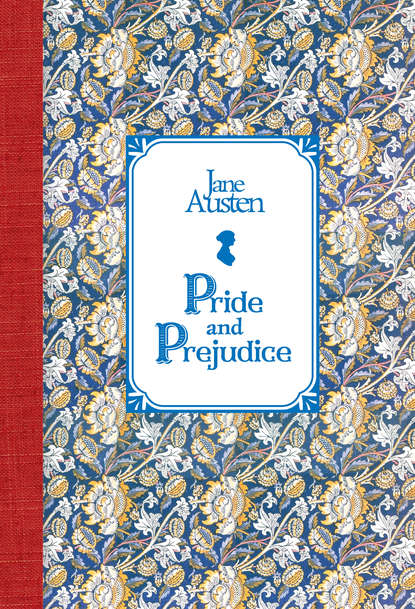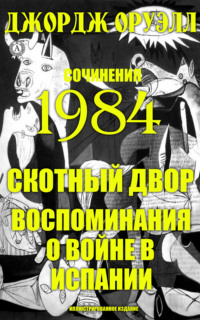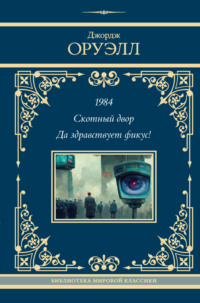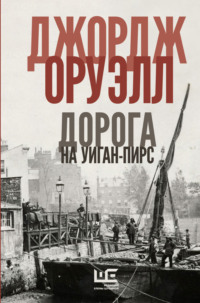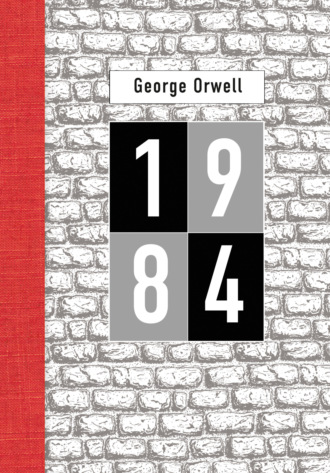
Полная версия
1984

But actually, he thought as he re-adjusted the Ministry of Plenty’s figures, it was not even forgery. It was merely the substitution of one piece of nonsense for another. Most of the material that you were dealing with had no connexion with anything in the real world, not even the kind of connexion that is contained in a direct lie. Statistics were just as much a fantasy in their original version as in their rectified version. A great deal of the time you were expected to make them up out of your head. For example, the Ministry of Plenty’s forecast had estimated the output of boots for the quarter at one-hundred-and-forty-five million pairs. The actual output was given as sixty-two millions. Winston, however, in rewriting the forecast, marked the figure down to fifty-seven millions, so as to allow for the usual claim that the quota had been overfulfilled. In any case, sixty-two millions was no nearer the truth than fifty-seven millions, or than one-hundred-and-forty-five millions. Very likely no boots had been produced at all. Likelier still, nobody knew how many had been produced, much less cared. All one knew was that every quarter astronomical numbers of boots were produced on paper, while perhaps half the population of Oceania went barefoot. And so it was with every class of recorded fact, great or small. Everything faded away into a shadow-world in which, finally, even the date of the year had become uncertain.
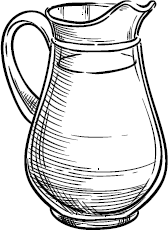

Winston glanced across the hall. In the corresponding cubicle on the other side a small, precise-looking, dark-chinned man named Tillotson was working steadily away, with a folded newspaper on his knee and his mouth very close to the mouthpiece of the speakwrite. He had the air of trying to keep what he was saying a secret between himself and the telescreen. He looked up, and his spectacles darted a hostile flash in Winston’s direction.
Winston hardly knew Tillotson, and had no idea what work he was employed on. People in the Records Department did not readily talk about their jobs. In the long, windowless hall, with its double row of cubicles and its endless rustle of papers and hum of voices murmuring into speakwrites, there were quite a dozen people whom Winston did not even know by name, though he daily saw them hurrying to and fro in the corridors or gesticulating in the Two Minutes Hate. He knew that in the cubicle next to him the little woman with sandy hair toiled day in day out, simply at tracking down and deleting from the Press the names of people who had been vaporized and were therefore considered never to have existed. There was a certain fitness in this, since her own husband had been vaporized a couple of years earlier. And a few cubicles away a mild, ineffectual, dreamy creature named Ampleforth, with very hairy ears and a surprising talent for juggling with rhymes and metres, was engaged in producing garbled versions – definitive texts, they were called – of poems which had become ideologically offensive, but which for one reason or another were to be retained in the anthologies. And this hall, with its fifty workers or thereabouts, was only one sub-section, a single cell, as it were, in the huge complexity of the Records Department. Beyond, above, below, were other swarms of workers engaged in an unimaginable multitude of jobs. There were the huge printing-shops with their sub-editors, their typography experts, and their elaborately equipped studios for the faking of photographs. There was the teleprogrammes section with its engineers, its producers, and its teams of actors specially chosen for their skill in imitating voices. There were the armies of reference clerks whose job was simply to draw up lists of books and periodicals which were due for recall. There were the vast repositories where the corrected documents were stored, and the hidden furnaces where the original copies were destroyed. And somewhere or other, quite anonymous, there were the directing brains who co-ordinated the whole effort and laid down the lines of policy which made it necessary that this fragment of the past should be preserved, that one falsified, and the other rubbed out of existence.
And the Records Department, after all, was itself only a single branch of the Ministry of Truth, whose primary job was not to reconstruct the past but to supply the citizens of Oceania with newspapers, films, textbooks, telescreen programmes, plays, novels – with every conceivable kind of information, instruction, or entertainment, from a statue to a slogan, from a lyric poem to a biological treatise, and from a child’s spelling-book to a Newspeak dictionary. And the Ministry had not only to supply the multifarious needs of the party, but also to repeat the whole operation at a lower level for the benefit of the proletariat. There was a whole chain of separate departments dealing with proletarian literature, music, drama, and entertainment generally. Here were produced rubbishy newspapers containing almost nothing except sport, crime and astrology, sensational five-cent novelettes, films oozing with sex, and sentimental songs which were composed entirely by mechanical means on a special kind of kaleidoscope known as a versificator. There was even a whole sub-section –Pornosec, it was called in Newspeak – engaged in producing the lowest kind of pornography, which was sent out in sealed packets and which no Party member, other than those who worked on it, was permitted to look at.
Three messages had slid out of the pneumatic tube while Winston was working, but they were simple matters, and he had disposed of them before the Two Minutes Hate interrupted him. When the Hate was over he returned to his cubicle, took the Newspeak dictionary from the shelf, pushed the speakwrite to one side, cleaned his spectacles, and settled down to his main job of the morning.
Winston’s greatest pleasure in life was in his work. Most of it was a tedious routine, but included in it there were also jobs so difficult and intricate that you could lose yourself in them as in the depths of a mathematical problem – delicate pieces of forgery in which you had nothing to guide you except your knowledge of the principles of Ingsoc and your estimate of what the Party wanted you to say. Winston was good at this kind of thing. On occasion he had even been entrusted with the rectification ofThe Times leading articles, which were written entirely in Newspeak. He unrolled the message that he had set aside earlier. It ran:
times 3.12.83 reporting bb dayorder doubleplusungood refs unpersons rewrite fullwise upsub antefiling
In Oldspeak (or standard English) this might be rendered:
The reporting of Big Brother’s Order for the Day in The Times of December 3rd 1983 is extremely unsatisfactory and makes references to non-existent persons. Rewrite it in full and submit your draft to higher authority before filing.
Winston read through the offending article. Big Brother’s Order for the Day, it seemed, had been chiefly devoted to praising the work of an organization known as FFCC, which supplied cigarettes and other comforts to the sailors in the Floating Fortresses. A certain Comrade Withers, a prominent member of the Inner Party, had been singled out for special mention and awarded a decoration, the Order of Conspicuous Merit, Second Class.
Three months later FFCC had suddenly been dissolved with no reasons given. One could assume that Withers and his associates were now in disgrace, but there had been no report of the matter in the Press or on the telescreen. That was to be expected, since it was unusual for political offenders to be put on trial or even publicly denounced. The great purges involving thousands of people, with public trials of traitors and thought-criminals who made abject confession of their crimes and were afterwards executed, were special show-pieces not occurring oftener than once in a couple of years. More commonly, people who had incurred the displeasure of the Party simply disappeared and were never heard of again. One never had the smallest clue as to what had happened to them. In some cases they might not even be dead. Perhaps thirty people personally known to Winston, not counting his parents, had disappeared at one time or another.
Winston stroked his nose gently with a paper-clip. In the cubicle across the way Comrade Tillotson was still crouching secretively over his speakwrite. He raised his head for a moment: again the hostile spectacle-flash. Winston wondered whether Comrade Tillotson was engaged on the same job as himself. It was perfectly possible. So tricky a piece of work would never be entrusted to a single person: on the other hand, to turn it over to a committee would be to admit openly that an act of fabrication was taking place. Very likely as many as a dozen people were now working away on rival versions of what Big Brother had actually said. And presently some master brain in the Inner Party would select this version or that, would re-edit it and set in motion the complex processes of cross-referencing that would be required, and then the chosen lie would pass into the permanent records and become truth.
Winston did not know why Withers had been disgraced. Perhaps it was for corruption or incompetence. Perhaps Big Brother was merely getting rid of a too-popular subordinate. Perhaps Withers or someone close to him had been suspected of heretical tendencies. Or perhaps – what was likeliest of all – the thing had simply happened because purges and vaporizations were a necessary part of the mechanics of government. The only real clue lay in the words ‘refs unpersons’, which indicated that Withers was already dead. You could not invariably assume this to be the case when people were arrested. Sometimes they were released and allowed to remain at liberty for as much as a year or two years before being executed. Very occasionally some person whom you had believed dead long since would make a ghostly reappearance at some public trial where he would implicate hundreds of others by his testimony before vanishing, this time for ever. Withers, however, was already anunperson. He did not exist: he had never existed. Winston decided that it would not be enough simply to reverse the tendency of Big Brother’s speech. It was better to make it deal with something totally unconnected with its original subject.
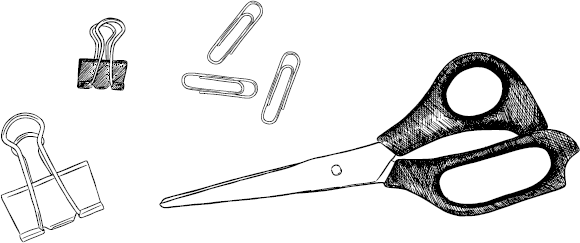
He might turn the speech into the usual denunciation of traitors and thought-criminals, but that was a little too obvious, while to invent a victory at the front, or some triumph of over-production in the Ninth Three-Year Plan, might complicate the records too much. What was needed was a piece of pure fantasy. Suddenly there sprang into his mind, ready made as it were, the image of a certain Comrade Ogilvy, who had recently died in battle, in heroic circumstances. There were occasions when Big Brother devoted his Order for the Day to commemorating some humble, rank-and-file Party member whose life and death he held up as an example worthy to be followed. Today he should commemorate Comrade Ogilvy. It was true that there was no such person as Comrade Ogilvy, but a few lines of print and a couple of faked photographs would soon bring him into existence.
Winston thought for a moment, then pulled the speakwrite towards him and began dictating in Big Brother’s familiar style: a style at once military and pedantic, and, because of a trick of asking questions and then promptly answering them (‘What lessons do we learn from this fact, comrades? The lesson – which is also one of the fundamental principles of Ingsoc – that,’ etc., etc.), easy to imitate.
At the age of three Comrade Ogilvy had refused all toys except a drum, a sub-machine gun, and a model helicopter. At six – a year early, by a special relaxation of the rules – he had joined the Spies, at nine he had been a troop leader. At eleven he had denounced his uncle to the Thought Police after overhearing a conversation which appeared to him to have criminal tendencies. At seventeen he had been a district organizer of the Junior Anti-Sex League. At nineteen he had designed a hand-grenade which had been adopted by the Ministry of Peace and which, at its first trial, had killed thirty-one Eurasian prisoners in one burst. At twenty-three he had perished in action. Pursued by enemy jet planes while flying over the Indian Ocean with important despatches, he had weighted his body with his machine gun and leapt out of the helicopter into deep water, despatches and all – an end, said Big Brother, which it was impossible to contemplate without feelings of envy. Big Brother added a few remarks on the purity and single-mindedness of Comrade Ogilvy’s life. He was a total abstainer and a nonsmoker, had no recreations except a daily hour in the gymnasium, and had taken a vow of celibacy, believing marriage and the care of a family to be incompatible with a twenty-four-hour-a-day devotion to duty. He had no subjects of conversation except the principles of Ingsoc, and no aim in life except the defeat of the Eurasian enemy and the hunting-down of spies, saboteurs, thought-criminals, and traitors generally.
Winston debated with himself whether to award Comrade Ogilvy the Order of Conspicuous Merit: in the end he decided against it because of the unnecessary cross-referencing that it would entail.
Once again he glanced at his rival in the opposite cubicle. Something seemed to tell him with certainty that Tillotson was busy on the same job as himself. There was no way of knowing whose job would finally be adopted, but he felt a profound conviction that it would be his own. Comrade Ogilvy, unimagined an hour ago, was now a fact. It struck him as curious that you could create dead men but not living ones. Comrade Ogilvy, who had never existed in the present, now existed in the past, and when once the act of forgery was forgotten, he would exist just as authentically, and upon the same evidence, as Charlemagne or Julius Caesar.
5
In the low-ceilinged canteen, deep underground, the lunch queue jerked slowly forward. The room was already very full and deafeningly noisy. From the grille at the counter the steam of stew came pouring forth, with a sour metallic smell which did not quite overcome the fumes of Victory Gin. On the far side of the room there was a small bar, a mere hole in the wall, where gin could be bought at ten cents the large nip.
‘Just the man I was looking for,’ said a voice at Winston’s back.
He turned round. It was his friend Syme, who worked in the Research Department. Perhaps ‘friend’ was not exactly the right word. You did not have friends nowadays, you had comrades: but there were some comrades whose society was pleasanter than that of others. Syme was a philologist, a specialist in Newspeak. Indeed, he was one of the enormous team of experts now engaged in compiling the Eleventh Edition of the Newspeak Dictionary. He was a tiny creature, smaller than Winston, with dark hair and large, protuberant eyes, at once mournful and derisive, which seemed to search your face closely while he was speaking to you.
‘I wanted to ask you whether you’d got any razor blades,’ he said.
‘Not one!’ said Winston with a sort of guilty haste. ‘I’ve tried all over the place. They don’t exist any longer.’
Everyone kept asking you for razor blades. Actually he had two unused ones which he was hoarding up. There had been a famine of them for months past. At any given moment there was some necessary article which the Party shops were unable to supply. Sometimes it was buttons, sometimes it was darning wool, sometimes it was shoelaces; at present it was razor blades. You could only get hold of them, if at all, by scrounging more or less furtively on the ‘free’ market.
‘I’ve been using the same blade for six weeks,’ he added untruthfully.
The queue gave another jerk forward. As they halted he turned and faced Syme again. Each of them took a greasy metal tray from a pile at the end of the counter.
‘Did you go and see the prisoners hanged yesterday?’ said Syme.
‘I was working,’ said Winston indifferently. ‘I shall see it on the flicks, I suppose.’
‘A very inadequate substitute,’ said Syme.
His mocking eyes roved over Winston’s face. ‘I know you,’ the eyes seemed to say, ‘I see through you. I know very well why you didn’t go to see those prisoners hanged.’ In an intellectual way, Syme was venomously orthodox. He would talk with a disagreeable gloating satisfaction of helicopter raids on enemy villages, and trials and confessions of thought-criminals, the executions in the cellars of the Ministry of Love. Talking to him was largely a matter of getting him away from such subjects and entangling him, if possible, in the technicalities of Newspeak, on which he was authoritative and interesting. Winston turned his head a little aside to avoid the scrutiny of the large dark eyes.
‘It was a good hanging,’ said Syme reminiscently. ‘I think it spoils it when they tie their feet together. I like to see them kicking. And above all, at the end, the tongue sticking right out, and blue – a quite bright blue. That’s the detail that appeals to me.’
‘Next, please!’ yelled the white-aproned prole with the ladle.
Winston and Syme pushed their trays beneath the grille. On to each was dumped swiftly the regulation lunch – a metal pannikin of pinkish-grey stew, a hunk of bread, a cube of cheese, a mug of milkless Victory Coffee, and one saccharine tablet.
‘There’s a table over there, under that telescreen,’ said Syme. ‘Let’s pick up a gin on the way.’
The gin was served out to them in handleless china mugs. They threaded their way across the crowded room and unpacked their trays on to the metal-topped table, on one corner of which someone had left a pool of stew, a filthy liquid mess that had the appearance of vomit. Winston took up his mug of gin, paused for an instant to collect his nerve, and gulped the oily-tasting stuff down. When he had winked the tears out of his eyes he suddenly discovered that he was hungry. He began swallowing spoonfuls of the stew, which, in among its general sloppiness, had cubes of spongy pinkish stuff which was probably a preparation of meat. Neither of them spoke again till they had emptied their pannikins. From the table at Winston’s left, a little behind his back, someone was talking rapidly and continuously, a harsh gabble almost like the quacking of a duck, which pierced the general uproar of the room.
‘How is the Dictionary getting on?’ said Winston, raising his voice to overcome the noise.
‘Slowly,’ said Syme. ‘I’m on the adjectives. It’s fascinating.’
He had brightened up immediately at the mention of Newspeak. He pushed his pannikin aside, took up his hunk of bread in one delicate hand and his cheese in the other, and leaned across the table so as to be able to speak without shouting.
‘The Eleventh Edition is the definitive edition,’ he said. ‘We’re getting the language into its final shape – the shape it’s going to have when nobody speaks anything else. When we’ve finished with it, people like you will have to learn it all over again. You think, I dare say, that our chief job is inventing new words. But not a bit of it! We’re destroying words – scores of them, hundreds of them, every day. We’re cutting the language down to the bone. The Eleventh Edition won’t contain a single word that will become obsolete before the year 2050.’
He bit hungrily into his bread and swallowed a couple of mouthfuls, then continued speaking, with a sort of pedant’s passion. His thin dark face had become animated, his eyes had lost their mocking expression and grown almost dreamy.
‘It’s a beautiful thing, the destruction of words. Of course the great wastage is in the verbs and adjectives, but there are hundreds of nouns that can be got rid of as well. It isn’t only the synonyms; there are also the antonyms. After all, what justification is there for a word which is simply the opposite of some other word? A word contains its opposite in itself. Take “good”, for instance. If you have a word like “good”, what need is there for a word like “bad”? “Ungood” will do just as well – better, because it’s an exact opposite, which the other is not. Or again, if you want a stronger version of “good”, what sense is there in having a whole string of vague useless words like “excellent” and “splendid” and all the rest of them? “Plusgood” covers the meaning, or “doubleplusgood” if you want something stronger still. Of course we use those forms already. But in the final version of Newspeak there’ll be nothing else. In the end the whole notion of goodness and badness will be covered by only six words – in reality, only one word. Don’t you see the beauty of that, Winston? It was B.B.’s idea originally, of course,’ he added as an afterthought.
A sort of vapid eagerness flitted across Winston’s face at the mention of Big Brother. Nevertheless Syme immediately detected a certain lack of enthusiasm.
‘You haven’t a real appreciation of Newspeak, Winston,’ he said almost sadly. ‘Even when you write it you’re still thinking in Oldspeak. I’ve read some of those pieces that you write inThe Times occasionally. They’re good enough, but they’re translations. In your heart you’d prefer to stick to Oldspeak, with all its vagueness and its useless shades of meaning. You don’t grasp the beauty of the destruction of words. Do you know that Newspeak is the only language in the world whose vocabulary gets smaller every year?’
Winston did know that, of course. He smiled, sympathetically he hoped, not trusting himself to speak. Syme bit off another fragment of the dark-coloured bread, chewed it briefly, and went on:
‘Don’t you see that the whole aim of Newspeak is to narrow the range of thought? In the end we shall make thoughtcrime literally impossible, because there will be no words in which to express it. Every concept that can ever be needed, will be expressed by exactly one word, with its meaning rigidly defined and all its subsidiary meanings rubbed out and forgotten. Already, in the Eleventh Edition, we’re not far from that point. But the process will still be continuing long after you and I are dead. Every year fewer and fewer words, and the range of consciousness always a little smaller. Even now, of course, there’s no reason or excuse for committing thoughtcrime. It’s merely a question of self-discipline, reality-control. But in the end there won’t be any need even for that. The Revolution will be complete when the language is perfect. Newspeak is Ingsoc and Ingsoc is Newspeak,’ he added with a sort of mystical satisfaction. ‘Has it ever occurred to you, Winston, that by the year 2050, at the very latest, not a single human being will be alive who could understand such a conversation as we are having now?’
‘Except—’ began Winston doubtfully, and he stopped.
It had been on the tip of his tongue to say ‘Except the proles,’ but he checked himself, not feeling fully certain that this remark was not in some way unorthodox. Syme, however, had divined what he was about to say.
‘The proles are not human beings,’ he said carelessly. ‘By 2050 – earlier, probably – all real knowledge of Oldspeak will have disappeared. The whole literature of the past will have been destroyed. Chaucer, Shakespeare, Milton, Byron – they’ll exist only in Newspeak versions, not merely changed into something different, but actually changed into something contradictory of what they used to be. Even the literature of the Party will change. Even the slogans will change. How could you have a slogan like “freedom is slavery” when the concept of freedom has been abolished? The whole climate of thought will be different. In fact there will be no thought, as we understand it now. Orthodoxy means not thinking – not needing to think. Orthodoxy is unconsciousness.’
One of these days, thought Winston with sudden deep conviction, Syme will be vaporized. He is too intelligent. He sees too clearly and speaks too plainly. The Party does not like such people. One day he will disappear. It is written in his face.
Winston had finished his bread and cheese. He turned a little sideways in his chair to drink his mug of coffee. At the table on his left the man with the strident voice was still talking remorselessly away. A young woman who was perhaps his secretary, and who was sitting with her back to Winston, was listening to him and seemed to be eagerly agreeing with everything that he said. From time to time Winston caught some such remark as ‘I think you’reso right, I do so agree with you’, uttered in a youthful and rather silly feminine voice. But the other voice never stopped for an instant, even when the girl was speaking. Winston knew the man by sight, though he knew no more about him than that he held some important post in the Fiction Department. He was a man of about thirty, with a muscular throat and a large, mobile mouth. His head was thrown back a little, and because of the angle at which he was sitting, his spectacles caught the light and presented to Winston two blank discs instead of eyes. What was slightly horrible, was that from the stream of sound that poured out of his mouth it was almost impossible to distinguish a single word. Just once Winston caught a phrase – ‘complete and final elimination of Goldsteinism’ – jerked out very rapidly and, as it seemed, all in one piece, like a line of type cast solid. For the rest it was just a noise, a quack-quack-quacking. And yet, though you could not actually hear what the man was saying, you could not be in any doubt about its general nature. He might be denouncing Goldstein and demanding sterner measures against thought-criminals and saboteurs, he might be fulminating against the atrocities of the Eurasian army, he might be praising Big Brother or the heroes on the Malabar front – it made no difference. Whatever it was, you could be certain that every word of it was pure orthodoxy, pure Ingsoc. As he watched the eyeless face with the jaw moving rapidly up and down, Winston had a curious feeling that this was not a real human being but some kind of dummy. It was not the man’s brain that was speaking, it was his larynx. The stuff that was coming out of him consisted of words, but it was not speech in the true sense: it was a noise uttered in unconsciousness, like the quacking of a duck.





